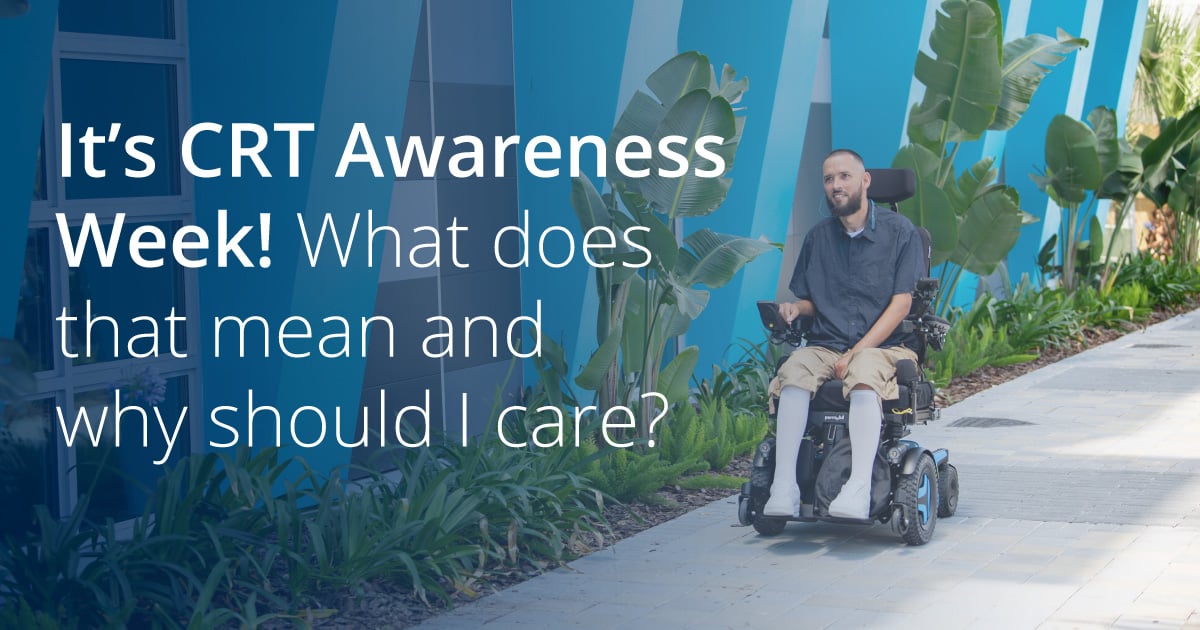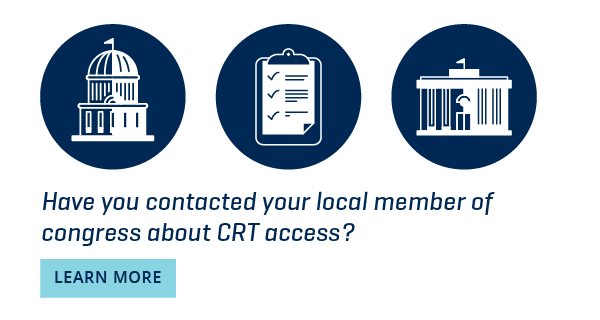“Complex Rehab Technology (CRT) includes individually configured wheelchairs, seating systems, and other adaptive equipment prescribed to meet the specific needs of people with disabilities such as ALS, cerebral palsy, multiple sclerosis, and spinal cord injury. This specialized equipment addresses their medical needs, reduces their health care costs, and maximizes their function and independence”. (taken from access2crt.org)
CRT Awareness Week is meant to let people know how important CRT is, and to inform the public of current legislation related to CRT. It happens every August when members of Congress are in their home offices and the goal is to mobilize people to reach out to their Congressmen and ask for their support on Bills that protect access to CRT.
“We need Congress to protect access by passing important legislation this year”. (taken from access2CRT.org)
What Current Bills Can Protect Access to CRT?
There are two current Bills that everyone should be aware of. I’ll try to explain each bill and give a brief history of why it’s needed.
1. Protect Complex Rehab Manual Wheelchairs: Bills H.R. 2293 and S.1223Since the Competitive Bidding Program was initiated in 2003 there has been a cut in payment amounts for important accessories which are part of the individualization of complex rehab manual wheelchairs. CMS basically has accessories for standard Durable Medical Equipment (DME) manual wheelchairs and accessories for CRT wheelchairs under the same HCPC billing code, so they are reimbursed the same.
Why is this a problem? CRT accessories are designed to meet unique individual needs and cost more to make than standard DME accessories. This makes it very difficult for suppliers to provide these CRT accessories, since they are not getting reimbursed what it costs to get them. And this can result in reduced access to the end user. These two Bills were developed to stop these inappropriate payment cuts.
This leads into the next important Bill that needs to pass which would separate benefits for CRT from DME.
2. Create Separate Benefit Category: Bill H.R.2408This Bill is addressing the bigger problem that was introduced in the description of the last Bills. CRT needs to be considered its own category and payments should reflect the individualization of this technology to appropriately meet the needs of people with disabilities and chronic medical conditions.
“A separate CRT category will allow for needed improvements in coverage policies, coding, and quality standards to better address the unique needs of people with significant disabilities and chronic medical conditions. These individuals rely on CRT products to manage their medical needs, minimize their health care costs, and maximize their function and independence.” (taken from access2crt.org)
The problem is that CMS does not understand the difference between CRT and DME. The DME benefit was initiated 50 years ago and was based on meeting the needs of elderly people. Advances in technology and innovation in these past 50 years has led to equipment and technology that provides function, independence, health, and quality of life for individuals with disabilities and/or chronic medical conditions. CRT serves people who use their wheelchairs all day, every day. It serves as their means of mobility and function and must be highly individualized to accomplish this. DME on the other hand is still very similar to what it was 50 years ago, what I call “cookie cutter” equipment. DME wheelchairs come in limited standard sizes and have very minimal adjustability, if any. By applying the same rules of payment for CRT and DME, it’s like saying diamonds and cubic zirconias are the same quality and should cost the same. It just doesn’t make sense!
What Can I Do?
There’s lots you can do and access2crt.org has made it really easy for you to do it! The goal is to get as many emails, calls, and visits to Congressmen across the country to ask them to sign on to these bills. All you need to do is:
- Go to http://www.access2crt.org/advocacy
- Click on “Send the Email”. This auto-populates your message, you just need to insert your personal information.
- Click on “Make the Call” By inserting your personal information, this connects you to your local Congressmen.
- Haven’t gotten a response? Click on “Send Your Follow Up” and it will auto-populate a follow up letter.
- Keep at it until you get a response or speak with the right person!
This only takes 2 minutes of your time!! Do it today!!
Are There Other Ways I can Help?
Use your social media outlets to get the word out there!
- Tweet, post, tag, and talk about CRT week
- Use #CRTawareness and share access2crt.org
- Tweet your Congressmen and let them know the Bills you want their support for
- Make a video and tell your CRT story
Let’s band together and make a difference this week!!
 Stacey Mullis, OTR/ATP
Stacey Mullis, OTR/ATP
Director of Clinical Marketing
Stacey serves as Director of Clinical Marketing for Permobil. A practicing OTR for over 20 years, she has experience in school-based pediatrics, inpatient rehabilitation, long term care, and home health. With her interest in wheelchair seating and positioning, Stacey engaged the challenges of providing appropriate seating in various clinical settings. She now uses this experience to develop programs and resources to educate clinicians on the principles of seating and wheeled mobility. She is passionate about equipping clinicians and through her previous role as Director of Clinical Education with Comfort Company and now with Permobil she has taught nationally and internationally to increase therapist capacity in this specialty area. Mullis graduated from Western University in London, Ontario, Canada with a BA Linguistics and BSc Occupational Therapy. She is a member of the NCOTA, CTF Executive Board, NRRTs, RESNA, and AOTA.

